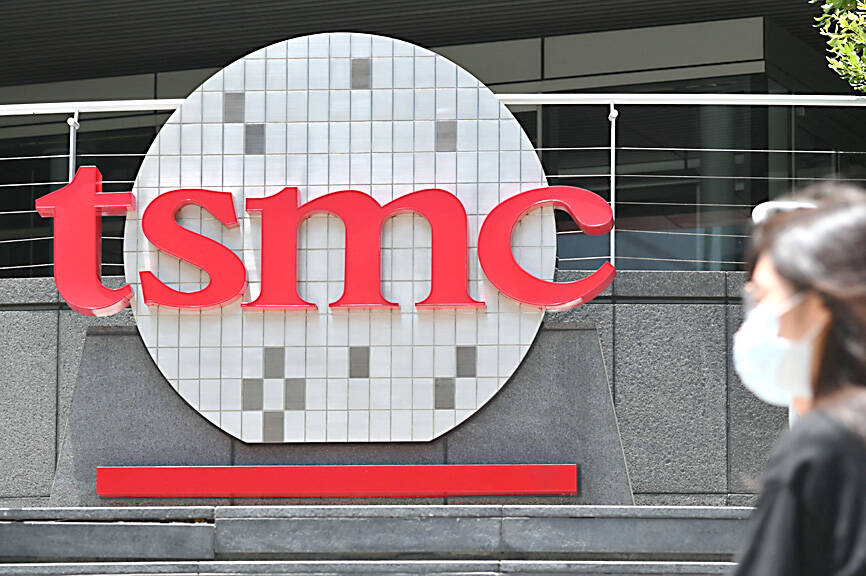Taiwan Semiconductor Manufacturing Co (TSMC, 台積電) plans to build a 12-inch wafer fab in Dresden, Germany, to make automotive chips in partnership with major customers, the world’s largest chipmaker said yesterday.
The joint venture, European Semiconductor Manufacturing Co (ESMC) GmbH, is to be 70 percent owned by TSMC, while customers Robert Bosch GmbH, Infineon Technologies AG and NXP Semiconductors NV would each hold 10 percent, the Hsinchu-based company said in a statement.
Total investment is expected to exceed 10 billion euros (US$10.94 billion), consisting of equity injection, borrowing, and support from the EU and German government, TSMC said.

Photo: Sam Yeh, AFP
The creation of ESMC marks a significant step toward construction of a 12-inch fab to support demand from the fast-growing automotive and industrial sectors, the statement said.
The final investment decision would depend on the confirmation of the level of public funding for the project, it added.
The project is being planned under the framework of the European Chips Act.
“This investment in Dresden demonstrates TSMC’s commitment to serving our customers’ strategic capacity and technology needs, and we are excited at this opportunity to deepen our long-standing partnership with Bosch, Infineon, and NXP,” TSMC chief executive officer C.C. Wei (魏哲家) said in the statement.
“Europe is a highly promising place for semiconductor innovation, particularly in the automotive and industrial fields, and we look forward to bringing those innovations to life on our advanced silicon technology with the talent in Europe,” he added.
The planned fab is expected to have a monthly production capacity of 40,000 12-inch wafers deploying TSMC’s 28-nanometer and 22-nanometer process technologies.
It is expected to create about 2,000 direct high-tech professional jobs, the chipmaker said.
ESMC aims to begin construction of the fab in the second half of next year, with production expected to commence at the end of 2027, it said.
TSMC in January forecast that in about five years or more, about 20 percent of its 28-nanometer-and-below capacity would come from overseas fabs.
Aside from the planned fab in Dresden, the company is building chip plants in the US and Japan.
TSMC yesterday said that a new factory it is building in Kaohsiung will be used to bring its advanced 2-nanometer chips into mass production by 2025.
The Kaohsiung plant had initially been slated to produce TSMC's 28nm chips, but Wei in April said it would instead be used for one of the company's more advanced process technologies.
A TSMC spokesperson yesterday confirmed that the Kaohsiung plant has been selected as a production base for the 2nm technology, starting in 2025.
The company yesterday said its board of directors had approved an equity investment of up to 3.5 billion euros in ESMC, as well as a capital injection of US$4.5 billion to fund the construction of its Arizona fabs.
The board also approved the distribution of a cash dividend of NT$3 per share for the second quarter of this year.
It also approved a proposed capital appropriation of US$6.06 billion.
Additional reporting by CNA

‘ABUSE OF POWER’: Lee Chun-yi allegedly used a Control Yuan vehicle to transport his dog to a pet grooming salon and take his wife to restaurants, media reports said Control Yuan Secretary-General Lee Chun-yi (李俊俋) resigned on Sunday night, admitting that he had misused a government vehicle, as reported by the media. Control Yuan Vice President Lee Hung-chun (李鴻鈞) yesterday apologized to the public over the issue. The watchdog body would follow up on similar accusations made by the Chinese Nationalist Party (KMT) and would investigate the alleged misuse of government vehicles by three other Control Yuan members: Su Li-chiung (蘇麗瓊), Lin Yu-jung (林郁容) and Wang Jung-chang (王榮璋), Lee Hung-chun said. Lee Chun-yi in a statement apologized for using a Control Yuan vehicle to transport his dog to a

Taiwan yesterday denied Chinese allegations that its military was behind a cyberattack on a technology company in Guangzhou, after city authorities issued warrants for 20 suspects. The Guangzhou Municipal Public Security Bureau earlier yesterday issued warrants for 20 people it identified as members of the Information, Communications and Electronic Force Command (ICEFCOM). The bureau alleged they were behind a May 20 cyberattack targeting the backend system of a self-service facility at the company. “ICEFCOM, under Taiwan’s ruling Democratic Progressive Party, directed the illegal attack,” the warrant says. The bureau placed a bounty of 10,000 yuan (US$1,392) on each of the 20 people named in

The High Court yesterday found a New Taipei City woman guilty of charges related to helping Beijing secure surrender agreements from military service members. Lee Huei-hsin (李慧馨) was sentenced to six years and eight months in prison for breaching the National Security Act (國家安全法), making illegal compacts with government employees and bribery, the court said. The verdict is final. Lee, the manager of a temple in the city’s Lujhou District (蘆洲), was accused of arranging for eight service members to make surrender pledges to the Chinese People’s Liberation Army in exchange for money, the court said. The pledges, which required them to provide identification

INDO-PACIFIC REGION: Royal Navy ships exercise the right of freedom of navigation, including in the Taiwan Strait and South China Sea, the UK’s Tony Radakin told a summit Freedom of navigation in the Indo-Pacific region is as important as it is in the English Channel, British Chief of the Defence Staff Admiral Tony Radakin said at a summit in Singapore on Saturday. The remark came as the British Royal Navy’s flagship aircraft carrier, the HMS Prince of Wales, is on an eight-month deployment to the Indo-Pacific region as head of an international carrier strike group. “Upholding the UN Convention on the Law of the Sea, and with it, the principles of the freedom of navigation, in this part of the world matters to us just as it matters in the